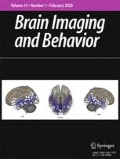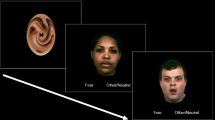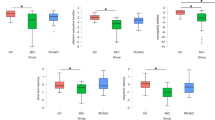Abstract
Facial affect recognition deficits following traumatic brain injury (TBI) have been well documented, as has their relationship with impairment in several other cognitive domains. However, little is known about the neurobiological mechanisms underlying affect recognition deficits, in particular mechanisms underlying different aspects of facial affect recognition (e.g., perceptual and interpretive processes). In the current study, 33 adults with moderate-to-severe TBI and 24 demographically matched healthy comparison (HC) participants completed an fMRI facial affect recognition study. While in the scanner, participants were asked to match the affect of a target face to either (a) one of two faces differing in affect (perceptual condition) or (b) one of two written affect labels (interpretative condition). In both groups we found activations in regions typically involved in affect recognition. Our results revealed that in the perceptual condition individuals with TBI tended to activate the left dorsolateral prefrontal cortex less than HCs, and within the HC group individuals with higher perceptual affect recognition scores showed higher levels of activation in the same brain region. Individuals with TBI who were specifically impaired at interpretative affect recognition showed less activation than HCs in the right fusiform gyrus. Moreover, in the labeling condition individuals with TBI tended to de-activate medial prefrontal regions less than HCs. A region of interest analysis revealed that individuals with TBI showed significantly less activation than HCs in the FFA for all the contrasts of interest. Our results suggest involvement of several brain regions in facial affect recognition impairment post TBI, and provide neurobiological support for the notion that distinct aspects of facial affect recognition can be differentially impaired following TBI.






Similar content being viewed by others
References
Andersson, J. L. R., Jenkinson, M., & Smith, S. (2007a). Non-linear optimisation. FMRIB technical report TR07JA1. Retrieved from www.fmrib.ox.ac.uk/analysis/techrep
Andersson, J. L. R., Jenkinson, M., & Smith, S. (2007b). Non-linear registration, aka Spatial normalisation FMRIB technical report TR07JA2.
Aupperle, R. L., Tankersley, D., Ravindran, L. N., Flagan, T., Stein, N. R., Stein, M. B., & Paulus, M. P. (2012). Pregabalin effects on neural response to emotional faces. Frontiers in Human Neuroscience, 6, 42. https://doi.org/10.3389/fnhum.2012.00042.
Barbey, A. K., Belli, A., Logan, A., Rubin, R., Zamroziewicz, M., & Operskalski, J. T. (2015). Network topology and dynamics in traumatic brain injury. Curr Opin Behav Sciences, 4, 92–102.
Berman, M. G., Park, J., Gonzalez, R., Polk, T. A., Gehrke, A., Knaffla, S., & Jonides, J. (2010). Evaluating functional localizers: the case of the FFA. NeuroImage, 50(1), 56–71. https://doi.org/10.1016/j.neuroimage.2009.12.024.
Biswal, B., Yetkin, F. Z., Haughton, V. M., & Hyde, J. S. (1995). Functional connectivity in the motor cortex of resting human brain using echo-planar MRI. Magnetic Resonance in Medicine, 34(4), 537–541.
Bornhofen, C., & McDonald, S. (2008). Emotion perception deficits following traumatic brain injury: a review of the evidence and rationale for intervention. Journal of the International Neuropsychological Society, 14(4), 511–525. https://doi.org/10.1017/S1355617708080703.
Brodeur, M. B., Dionne-Dostie, E., Montreuil, T., & Lepage, M. (2010). The Bank of Standardized Stimuli (BOSS), a new set of 480 normative photos of objects to be used as visual stimuli in cognitive research. PLoS One, 5(5), e10773. https://doi.org/10.1371/journal.pone.0010773.
Croker, V., & McDonald, S. (2005). Recognition of emotion from facial expression following traumatic brain injury. Brain Injury, 19(10), 787–799.
Desikan, R. S., Segonne, F., Fischl, B., Quinn, B. T., Dickerson, B. C., Blacker, D., et al. (2006). An automated labeling system for subdividing the human cerebral cortex on MRI scans into gyral based regions of interest. NeuroImage, 31(3), 968–980. https://doi.org/10.1016/j.neuroimage.2006.01.021.
Dotsch, R., Wigboldus, D. H., Langner, O., & van Knippenberg, A. (2008). Ethnic out-group faces are biased in the prejudiced mind. Psychological Science, 19(10), 978–980. https://doi.org/10.1111/j.1467-9280.2008.02186.x.
Eklund, A., Nichols, T. E., & Knutsson, H. (2016). Cluster failure: Why fMRI inferences for spatial extent have inflated false-positive rates. Proceedings of the National Academy of Sciences of the United States of America, 113(28), 7900–7905. https://doi.org/10.1073/pnas.1602413113.
Ferrucci, R., Giannicola, G., Rosa, M., Fumagalli, M., Boggio, P. S., Haller, M., et al. (2012). Cerebellum and processing of negative facial emotions: Cerebellar transcranial DC stimulation specifically enhances the emotional recognition of facial anger and sadness. Cognition and Emotion, 26(5), 786–799.
Fox, M. D., & Greicius, M. (2010). Clinical applications of resting state functional connectivity. Frontiers in Systems Neuroscience, 4, 19. https://doi.org/10.3389/fnsys.2010.00019.
Frazier, J. A., Chiu, S., Breeze, J. L., Makris, N., Lange, N., Kennedy, D. N., et al. (2005). Structural brain magnetic resonance imaging of limbic and thalamic volumes in pediatric bipolar disorder. The American Journal of Psychiatry, 162(7), 1256–1265. https://doi.org/10.1176/appi.ajp.162.7.1256.
Frith, C., & Dolan, R. J. (1997). Brain mechanisms associated with top-down processes in perception. Philosophical Transactions of the Royal Society of London. Series B, Biological Sciences, 352(1358), 1221–1230. https://doi.org/10.1098/rstb.1997.0104.
Gee, D. G., Karlsgodt, K. H., van Erp, T. G., Bearden, C. E., Lieberman, M. D., Belger, A., et al. (2012). Altered age-related trajectories of amygdala-prefrontal circuitry in adolescents at clinical high risk for psychosis: a preliminary study. Schizophrenia Research, 134(1), 1–9. https://doi.org/10.1016/j.schres.2011.10.005.
Genova, H. M., Rajagopalan, V., Chiaravalloti, N., Binder, A., Deluca, J., & Lengenfelder, J. (2015). Facial affect recognition linked to damage in specific white matter tracts in traumatic brain injury. Social Neuroscience, 10(1), 27–34. https://doi.org/10.1080/17470919.2014.959618.
Goldstein, J. M., Seidman, L. J., Makris, N., Ahern, T., O'Brien, L. M., Caviness Jr., V. S., et al. (2007). Hypothalamic abnormalities in schizophrenia: sex effects and genetic vulnerability. Biological Psychiatry, 61(8), 935–945. https://doi.org/10.1016/j.biopsych.2006.06.027.
Gordon, B. A., Zacks, J. M., Blazey, T., Benzinger, T. L., Morris, J. C., Fagan, A. M., et al. (2015). Task-evoked fMRI changes in attention networks are associated with preclinical Alzheimer's disease biomarkers. Neurobiology of Aging, 36(5), 1771–1779. https://doi.org/10.1016/j.neurobiolaging.2015.01.019.
Green, R. E., Turner, G. R., & Thompson, W. F. (2004). Deficits in facial emotion perception in adults with recent traumatic brain injury. Neuropsychologia, 42(2), 133–141.
Hariri, A. R., Bookheimer, S. Y., & Mazziotta, J. C. (2000). Modulating emotional responses: effects of a neocortical network on the limbic system. Neuroreport, 11(1), 43–48.
Ietswaart, M., Milders, M., Crawford, J. R., Currie, D., & Scott, C. L. (2008). Longitudinal aspects of emotion recognition in patients with traumatic brain injury. Neuropsychologia, 46(1), 148–159. https://doi.org/10.1016/j.neuropsychologia.2007.08.002.
Jenkinson, M., Bannister, P., Brady, M., & Smith, S. (2002). Improved optimization for the robust and accurate linear registration and motion correction of brain images. NeuroImage, 17(2), 825–841.
Kanwisher, N., & Yovel, G. (2006). The fusiform face area: a cortical region specialized for the perception of faces. Philosophical Transactions of the Royal Society of London. Series B, Biological Sciences, 361(1476), 2109–2128. https://doi.org/10.1098/rstb.2006.1934.
Kanwisher, N., McDermott, J., & Chun, M. M. (1997). The fusiform face area: a module in human extrastriate cortex specialized for face perception. The Journal of Neuroscience, 17(11), 4302–4311.
Kasahara, M., Menon, D. K., Salmond, C. H., Outtrim, J. G., Tavares, J. V., Carpenter, T. A., et al. (2011). Traumatic brain injury alters the functional brain network mediating working memory. Brain Injury, 25(12), 1170–1187. https://doi.org/10.3109/02699052.2011.608210.
Kelly Jr., R. E., Alexopoulos, G. S., Wang, Z., Gunning, F. M., Murphy, C. F., Morimoto, S. S., et al. (2010). Visual inspection of independent components: defining a procedure for artifact removal from fMRI data. Journal of Neuroscience Methods, 189(2), 233–245. https://doi.org/10.1016/j.jneumeth.2010.03.028.
Knox, L., & Douglas, J. (2009). Long-term ability to interpret facial expression after traumatic brain injury and its relation to social integration. Brain and Cognition, 69(2), 442–449. https://doi.org/10.1016/j.bandc.2008.09.009.
Kumfor, F., Irish, M., Hodges, J. R., & Piguet, O. (2013). Discrete Neural Correlates for the Recognition of Negative Emotions: Insights from Frontotemporal Dementia. PLoS One, 8(6), e67457. https://doi.org/10.1371/journal.pone.0067457.
Lundqvist, D., Bruce, N., & Ohman, A. (2015). Finding an emotional face in a crowd: emotional and perceptual stimulus factors influence visual search efficiency. Cognition & Emotion, 29(4), 621–633. https://doi.org/10.1080/02699931.2014.927352.
Makris, N., Goldstein, J. M., Kennedy, D., Hodge, S. M., Caviness, V. S., Faraone, S. V., et al. (2006). Decreased volume of left and total anterior insular lobule in schizophrenia. Schizophrenia Research, 83(2–3), 155–171. https://doi.org/10.1016/j.schres.2005.11.020.
Malec, J. F., Brown, A. W., Leibson, C. L., Flaada, J. T., Mandrekar, J. N., Diehl, N. N., & Perkins, P. K. (2007). The mayo classification system for traumatic brain injury severity. Journal of Neurotrauma, 24(9), 1417–1424. https://doi.org/10.1089/neu.2006.0245.
Maurer, D., Grand, R. L., & Mondloch, C. J. (2002). The many faces of configural processing. Trends in Cognitive Sciences, 6(6), 255–260.
McDonald, S., Rushby, J., Li, S., de Sousa, A., Dimoska, A., James, C., et al. (2011). The influence of attention and arousal on emotion perception in adults with severe traumatic brain injury. International Journal of Psychophysiology, 82(1), 124–131. https://doi.org/10.1016/j.ijpsycho.2011.01.014.
McDonald, B. C., Saykin, A. J., & McAllister, T. W. (2012). Functional MRI of mild traumatic brain injury (mTBI): progress and perspectives from the first decade of studies. Brain Imaging and Behavior, 6(2), 193–207. https://doi.org/10.1007/s11682-012-9173-4.
Montagne, B., Kessels, R. P., Frigerio, E., de Haan, E. H., & Perrett, D. I. (2005). Sex differences in the perception of affective facial expressions: do men really lack emotional sensitivity? Cognitive Processing, 6(2), 136–141. https://doi.org/10.1007/s10339-005-0050-6.
Neumann, D., Keiski, M. A., McDonald, B. C., & Wang, Y. (2014). Neuroimaging and facial affect processing: implications for traumatic brain injury. Brain Imaging and Behavior, 8(3), 460–473. https://doi.org/10.1007/s11682-013-9285-5.
Neumann, D., McDonald, B. C., West, J., Keiski, M. A., & Wang, Y. (2015). Neurobiological mechanisms associated with facial affect recognition deficits after traumatic brain injury. Brain Imaging and Behavior. https://doi.org/10.1007/s11682-015-9415-3.
Newsome, M. R., Steinberg, J. L., Scheibel, R. S., Troyanskaya, M., Chu, Z., Hanten, G., et al. (2008). Effects of traumatic brain injury on working memory-related brain activation in adolescents. Neuropsychology, 22(4), 419–425. https://doi.org/10.1037/0894-4105.22.4.419.
Nieuwhof, F., Bloem, B. R., Reelick, M. F., Aarts, E., Maidan, I., Mirelman, A., et al. (2017). Impaired dual tasking in Parkinson's disease is associated with reduced focusing of cortico-striatal activity. Brain. https://doi.org/10.1093/brain/awx042.
Owsley, C. (2011). Aging and vision. Vision Research, 51(13), 1610–1622. https://doi.org/10.1016/j.visres.2010.10.020.
Palermo, R., O'Connor, K. B., Davis, J. M., Irons, J., & McKone, E. (2013). New tests to measure individual differences in matching and labelling facial expressions of emotion, and their association with ability to recognise vocal emotions and facial identity. PLoS One, 8(6), e68126. https://doi.org/10.1371/journal.pone.0068126.
Palermo, R., Jeffery, L., Lewandowsky, J., Fiorentini, C., Irons, J. L., Dawel, A., et al. (2017). Adaptive Face Coding Contributes to Individual Differences in Facial Expression Recognition Independently of Affective Factors. Journal of Experimental Psychology. Human Perception and Performance. https://doi.org/10.1037/xhp0000463.
Parada, M., Gerard, M., Larcher, K., Dagher, A., & Binik, Y. M. (2016). Neural Representation of Subjective Sexual Arousal in Men and Women. The Journal of Sexual Medicine, 13(10), 1508–1522. https://doi.org/10.1016/j.jsxm.2016.08.008.
Phan, K. L., Wager, T., Taylor, S. F., & Liberzon, I. (2002). Functional neuroanatomy of emotion: a meta-analysis of emotion activation studies in PET and fMRI. NeuroImage, 16(2), 331–348. https://doi.org/10.1006/nimg.2002.1087.
Pruim, R. H., Mennes, M., Buitelaar, J. K., & Beckmann, C. F. (2015a). Evaluation of ICA-AROMA and alternative strategies for motion artifact removal in resting state fMRI. NeuroImage, 112, 278–287. https://doi.org/10.1016/j.neuroimage.2015.02.063.
Pruim, R. H., Mennes, M., van Rooij, D., Llera, A., Buitelaar, J. K., & Beckmann, C. F. (2015b). ICA-AROMA: A robust ICA-based strategy for removing motion artifacts from fMRI data. NeuroImage, 112, 267–277. https://doi.org/10.1016/j.neuroimage.2015.02.064.
Rigon, A., Turkstra, L., Mutlu, B., & Duff, M. (2016a). The female advantage: sex as a possible protective factor against emotion recognition impairment following traumatic brain injury. Cognitive, Affective, & Behavioral Neuroscience, 16(5), 866–875. https://doi.org/10.3758/s13415-016-0437-0.
Rigon, A., Voss, M. W., Turkstra, L. S., Mutlu, B., & Duff, M. C. (2016b). Frontal and Temporal Structural Connectivity Is Associated with Social Communication Impairment Following Traumatic Brain Injury. Journal of the International Neuropsychological Society, 22(7), 705–716. https://doi.org/10.1017/S1355617716000539.
Rigon, A., Voss, M. W., Turkstra, L. S., Mutlu, B., & Duff, M. C. (2017). Relationship between individual differences in functional connectivity and facial-emotion recognition abilities in adults with traumatic brain injury. Neuroimage Clin, 13, 370–377. https://doi.org/10.1016/j.nicl.2016.12.010.
Rigon, A., Turkstra, L., Mutlu, B., & Duff, M. (2018a). Facial-affect recognition deficit as a predictor of different aspects of social communication impairment in traumatic brain injury. Neuropsychology.
Rigon, A., Voss, M. W., Turkstra, L. S., Mutlu, B., & Duff, M. C. (2018b). Different aspects of facial affect recognition impairment following traumatic brain injury: The role of perceptual and interpretative abilities. Journal of Clinical and Experimental Neuropsychology, 1–15. https://doi.org/10.1080/13803395.2018.1437120.
Rosenberg, H., McDonald, S., Dethier, M., Kessels, R. P., & Westbrook, R. F. (2014). Facial emotion recognition deficits following moderate-severe Traumatic Brain Injury (TBI): re-examining the valence effect and the role of emotion intensity. Journal of the International Neuropsychological Society, 20(10), 994–1003. https://doi.org/10.1017/S1355617714000940.
Rosenberg, H., Dethier, M., Kessels, R. P., Westbrook, R. F., & McDonald, S. (2015). Emotion perception after moderate-severe traumatic brain injury: The valence effect and the role of working memory, processing speed, and nonverbal reasoning. Neuropsychology, 29(4), 509–521. https://doi.org/10.1037/neu0000171.
Sabatinelli, D., Fortune, E. E., Li, Q., Siddiqui, A., Krafft, C., Oliver, W. T., et al. (2011). Emotional perception: meta-analyses of face and natural scene processing. NeuroImage, 54(3), 2524–2533. https://doi.org/10.1016/j.neuroimage.2010.10.011.
Samu, D., Campbell, K. L., Tsvetanov, K. A., Shafto, M. A., Cam, C. A. N. C., & Tyler, L. K. (2017). Preserved cognitive functions with age are determined by domain-dependent shifts in network responsivity. Nature Communications, 8, 14743. https://doi.org/10.1038/ncomms14743.
Sanchez-Carrion, R., Fernandez-Espejo, D., Junque, C., Falcon, C., Bargallo, N., Roig, T., et al. (2008). A longitudinal fMRI study of working memory in severe TBI patients with diffuse axonal injury. NeuroImage, 43(3), 421–429. https://doi.org/10.1016/j.neuroimage.2008.08.003.
Shewan, C. M., & Kertesz, A. (1980). Reliability and validity characteristics of the Western Aphasia Battery (WAB). The Journal of Speech and Hearing Disorders, 45(3), 308–324.
Smith, S. M. (2002). Fast robust automated brain extraction. Human Brain Mapping, 17(3), 143–155. https://doi.org/10.1002/hbm.10062.
Smith, S. M., Jenkinson, M., Woolrich, M. W., Beckmann, C. F., Behrens, T. E., Johansen-Berg, H., et al. (2004). Advances in functional and structural MR image analysis and implementation as FSL. NeuroImage, 23(Suppl 1), S208–S219. https://doi.org/10.1016/j.neuroimage.2004.07.051.
Sood, M. R., & Sereno, M. I. (2016). Areas activated during naturalistic reading comprehension overlap topological visual, auditory, and somatotomotor maps. Human Brain Mapping, 37(8), 2784–2810. https://doi.org/10.1002/hbm.23208.
Spikman, J. M., Boelen, D. H., Pijnenborg, G. H., Timmerman, M. E., van der Naalt, J., & Fasotti, L. (2013). Who benefits from treatment for executive dysfunction after brain injury? Negative effects of emotion recognition deficits. Neuropsychological Rehabilitation, 23(6), 824–845. https://doi.org/10.1080/09602011.2013.826138.
Wang, J. X., Rogers, L. M., Gross, E. Z., Ryals, A. J., Dokucu, M. E., Brandstatt, K. L., et al. (2014). Targeted enhancement of cortical-hippocampal brain networks and associative memory. Science, 345(6200), 1054–1057. https://doi.org/10.1126/science.1252900.
Woolrich, M. (2008). Robust group analysis using outlier inference. NeuroImage, 41(2), 286–301. https://doi.org/10.1016/j.neuroimage.2008.02.042.
Woolrich, M. W., Jbabdi, S., Patenaude, B., Chappell, M., Makni, S., Behrens, T., et al. (2009). Bayesian analysis of neuroimaging data in FSL. NeuroImage, 45(1 Suppl), S173–S186. https://doi.org/10.1016/j.neuroimage.2008.10.055.
Worsley, K. J. (2001). Statistical analysis of activation images. In: P. Jezzard, P. M. Matthews, & S. M. Smith (eds.), Functional MRI: An Introduction to Methods: OUP.
Yang, Y. J. D., Allen, T., Abdullahi, S. M., Pelphrey, K. A., Volkmar, F. R., & Chapman, S. B. (2017). Brain responses to biological motion predict treatment outcome in young adults with autism receiving Virtual Reality Social Cognition Training: Preliminary findings. Behaviour Research and Therapy, 93, 55–66. https://doi.org/10.1016/j.brat.2017.03.014.
Ylvisaker, M., Turkstra, L. S., & Coelho, C. (2005). Behavioral and social interventions for individuals with traumatic brain injury: a summary of the research with clinical implications. Seminars in Speech and Language, 26(4), 256–267. https://doi.org/10.1055/s-2005-922104.
Funding
The study was funded by NICHD/NCMRR grant R01 HD071089, by an American Psychological Foundation Benton-Meier Fellowship, and by a pilot grant issued by the University of Iowa Magnetic Resonance Research Facility.
Author information
Authors and Affiliations
Corresponding author
Ethics declarations
Conflict of Interest
Arianna Rigon declares that she has no conflict of interest. Michelle Voss declares that she has no conflict of interest. Lyn Turkstra declares that she has no conflict of interest. Bilge Mutlu declares that he has no conflict of interest. Melissa Duff declares that she has no conflict of interest.
Ethical approval
All procedures performed in studies involving human participants were in accordance with the ethical standards of the institutional and/or national research committee and with the 1964 Helsinki declaration and its later amendments or comparable ethical standards.
Informed consent
Informed consent was obtained from all individual participants included in the study.
Rights and permissions
About this article
Cite this article
Rigon, A., Voss, M.W., Turkstra, L.S. et al. Functional neural correlates of facial affect recognition impairment following TBI. Brain Imaging and Behavior 13, 526–540 (2019). https://doi.org/10.1007/s11682-018-9889-x
Published:
Issue Date:
DOI: https://doi.org/10.1007/s11682-018-9889-x




